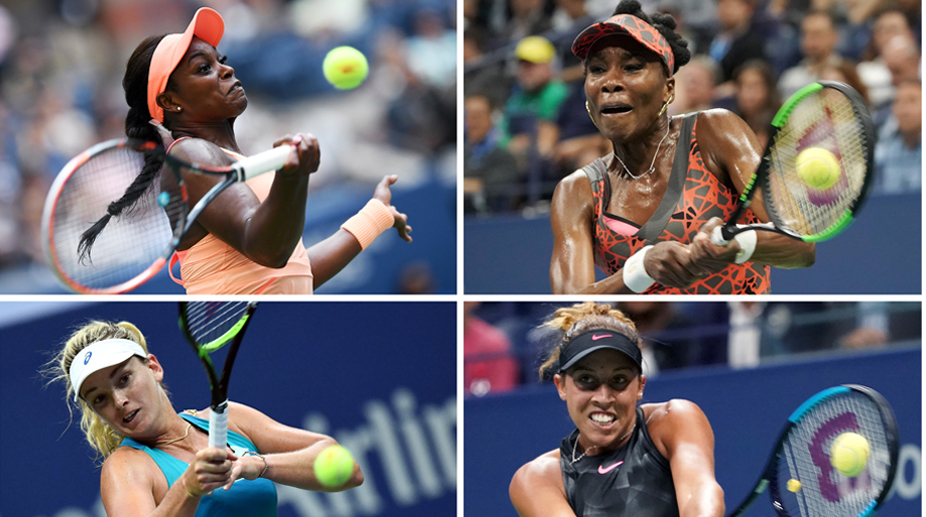For the first time since 1981, the US Open women’s semi-finals will be an all-American affair with seven-time Grand Slam champion Venus Williams and three first-Slam-title hopefuls in the mix.
Williams, seeking her third US Open crown after 2000 and 2001, will face Sloane Stephens while 20th seed CoCo Vandeweghe and 15th seed Madison Keys collide in Thursday’s matches at Arthur Ashe Stadium, with the winners meeting Saturday for the championship.
Advertisement
“It’s pretty awesome,” said Keys after completing the foursome with a 6-3, 6-3 victory Wednesday over Estonian qualifier Kaia Kanepi.
“I thought it would be a really special moment. I’m happy I helped out and got my name in there.”
No matter who advances, it will set up the first all- American US Open final since 2002, when Williams lost to younger sister Serena.
“It has been a great two weeks for American tennis, seeing all the American players in the draw and all of them advancing so deep and competing so well,” Williams said.
“It’s great to see this resurgence and I hope it can continue.”
US ninth seed Williams, enjoying one of her finest seasons at age 37, is leading the charge. This year’s Australian Open and Wimbledon runner-up is the US Open’s oldest semi-finalist and the oldest in any Slam since Martina Navratilova at Wimbledon in 1994.
“It’s such a wonderful feeling, because you put in so much work to be able to succeed at these moments,” said Williams, on the verge of making three Slam finals in a year for the first time since 2002.
Williams and Stephens in a showdown of African-American stars at Arthur Ashe Stadium shows the namesake barrier-breaker’s dream of tennis racial diversity is alive in the 20th anniversary season of the world’s largest tennis venue.
“It’s great for American tennis. It’s great for African- American women,” Stephens said. “I hope that we keep it going.”
Ashe, the first black man to win a Grand Slam title when he captured the 1968 US Open, battled racism and bigotry with grace and patience until his death in 1993.
“He’s a total legend,” Williams said. “He played during a time where he couldn’t just focus on the tennis. I’m very blessed to be able to focus on my game. But he had to fight because of the colour of his skin.
“It was a completely different time. So I can’t even imagine the pressure he was under. To come out of it with grace, as a champion, it’s incredible.”
Williams, whose first Slam final was on Ashe 20 years ago, will return to the world top five for the first time since January 2011, her highest level since being diagnosed with the strength-sapping illness Sjogren’s Syndrome.
Stephens, who missed 11 months with a left foot injury before returning at Wimbledon, beat Williams in the first round of the 2015 French Open in their only prior match.
“She’s a great player, a great person. She’s a great leader,” Stephens said. “I’m happy she’s still playing. She means a lot to the game.”
Stephens, ranked 83rd, has matched her deepest Slam run from the 2013 Australian Open.
“If someone would have told me when I started at Wimbledon that I’d be in the semifinals, I would have said they’re crazy,” Stephens said.
Vandeweghe eliminated Czech World No.1 Karolina Pliskova 7-6 (7/4), 6-3 before Keys, who is 2-0 against Vandeweghe, shook off nerves to win.
“I was real nervous,” Keys said. “The car ride over I was definitely feeling it but once I got out here I felt really good.”
Vandeweghe’s best Slam charge was into this year’s Australian Open semi-finals while Keys made her deepest run to the 2015 Australian Open semi-finals.
In 1981, Americans Barbara Potter, Chris Evert, Martina Navratilova and eventual winner Tracy Austin reached the final four.
The latest US players have looked to Venus, Serena, Lindsay Davenport and Jennifer Capriati as role models.
“We wanted to be those same players in a later generation. Now that we’re older, we can put that into words, but we all wanted to be there,” Vandeweghe said.











